Most Americans think there is too much economic inequality in the country these days, and about half say addressing inequality requires significant changes to the economic system. Even so, among those who see too much inequality, most (70%) say some amount is acceptable.
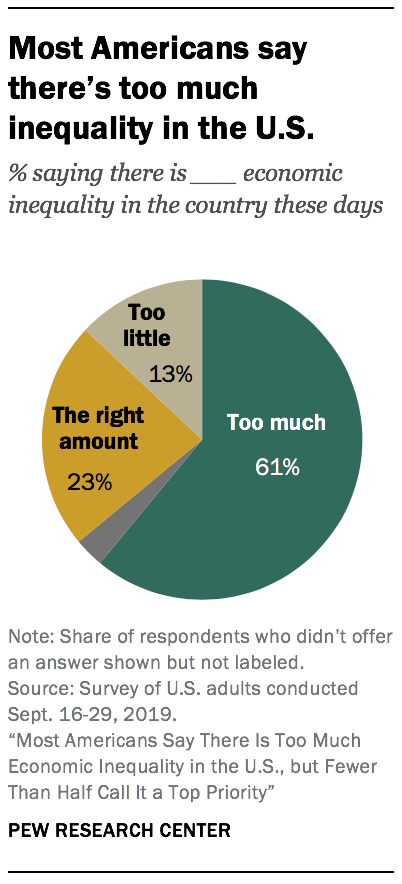
Roughly four-in-ten Americans (42%) say reducing inequality should be a top priority for the federal government. Among this group, large majorities say the influence it gives to the wealthy and the limits it places on people’s opportunities are major reasons why inequality should be given priority status. Relative to other issues, though, the public does not rank inequality among the country’s biggest problems.
Views on economic inequality differ significantly by party and by household income. And they differ by income within party coalitions – particularly among Republicans.
About six-in-ten Americans say there is too much economic inequality in the country
Overall, 61% of Americans say there is too much economic inequality in the country today. Roughly a quarter (23%) say the country has about the right amount of inequality and 13% say there is too little inequality.
Across income groups, the public is about equally likely to say there is too much economic inequality. However, upper- (27%) and middle-income Americans (26%) are more likely than those with lower incomes (17%) to say that there is about the right amount of economic inequality. Lower-income adults are more likely than those with middle and upper incomes to say there’s too little inequality.
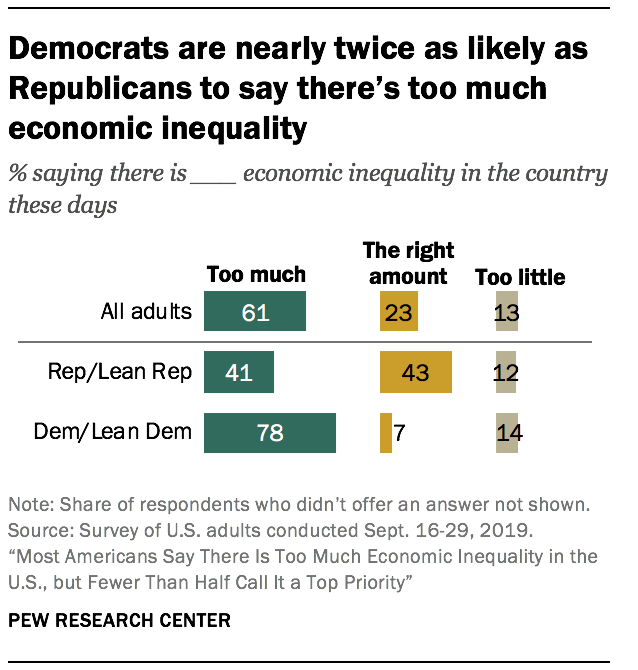
Views on this differ substantially by party. About four-in-ten Republicans and those who lean toward the Republican Party (41%) say there is too much inequality, compared with roughly eight-in-ten Democrats and Democratic leaners (78%). Instead, Republicans (43%) are much more likely than Democrats (7%) to say there is about the right amount of economic inequality in the country these days.
There are also differences by income tier within each party. Lower-income Republicans are more likely than higher-income Republicans to say there’s too much inequality in the country today (48% vs. 34%). In turn, higher-income Republicans are more likely than those with lower incomes to say there is the right amount of inequality (54% vs. 28%).
Among Democrats, majorities in all income groups say there is too much economic inequality. But higher-income Democrats are more likely to express concern over this issue: 93% of upper-income Democrats say there’s too much economic inequality in the country today, compared with 84% of middle-income Democrats and 65% of lower-income Democrats.
Most who see inequality as a problem say the economic system needs significant changes
Most Americans who see too much inequality in the country say that major changes are needed in order to address the issue. About two-thirds (67%) say this, while 14% say the system needs to be completely rebuilt. Roughly one-in-five (19%) say that only minor changes are required in order to address inequality.
Among those who say there is too much inequality, lower-income Americans are the most likely to say the system needs to be completely rebuilt – 18% say this compared with 13% of middle-income adults and 8% of those in the upper-income tier. Across income groups, roughly equal shares say the system will require major changes.
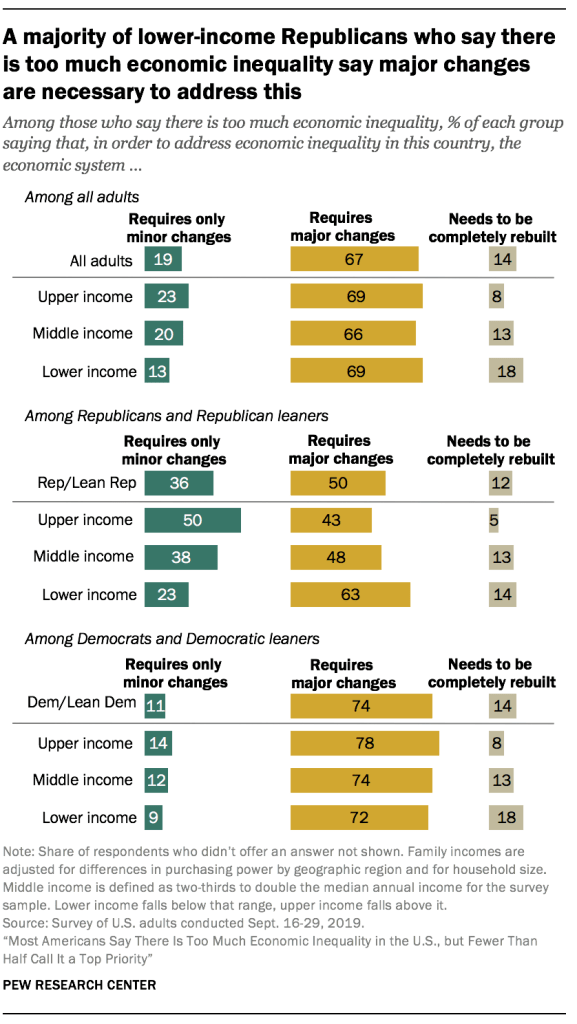
Again, there are differences by party. About a third of Republicans who say there is currently too much economic inequality (36%) say that only minor changes are required to fix the problem. Only 11% of Democrats who see too much inequality say the same. Instead, 74% of these Democrats think major changes are needed to fix the issue, compared with half of their Republican counterparts.
Republicans’ views about how much work is needed to address economic inequality differ by income. A majority of lower-income Republicans who see too much inequality (63%) say major changes are needed in order to address the issue. By comparison, only 43% of upper-income Republicans who see too much inequality say the same. About one-in-ten lower income Republicans (14%) say the system needs to be completely rebuilt in order to address inequality.
Among Democrats, there is generally more agreement across income groups. Upper- and lower-income Democrats who say there is too much inequality largely agree that the system requires major changes (78% among upper-income and 72% among lower-income). Even so, lower-income Democrats are more likely than middle- and upper-income Democrats to say the system needs to be completely rebuilt.
Most who see too much economic inequality say some amount of inequality is acceptable
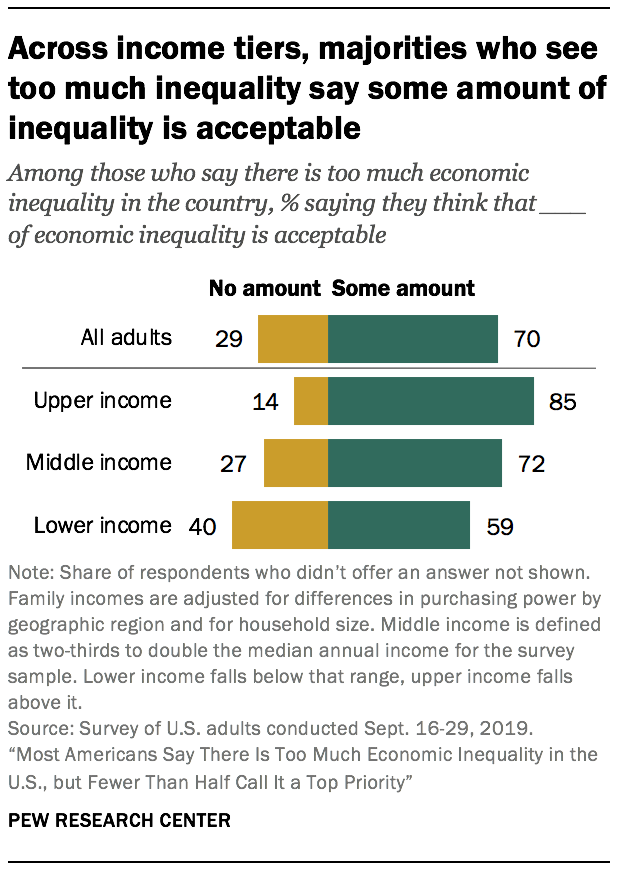
While most Americans say there is too much economic inequality in the country these days, many are willing to accept some level of it. Among those who say there is too much inequality, 70% say some amount is acceptable. About three-in-ten (29%) say no amount is acceptable.
Across all income groups, majorities of those who say there’s too much economic inequality say that some amount is acceptable. Still, upper-income Americans (85%) are more likely to say this than those with middle (72%) or lower incomes (59%). Among lower-income Americans who say there is too much inequality, 40% say that no amount of economic inequality is acceptable in the country.
Republicans and Democrats who say there is too much economic equality are largely in agreement on this point. Majorities from each group say some inequality is acceptable (77% among Republicans and 68% among Democrats).
Health care and drug addiction seen as more pressing problems than inequality
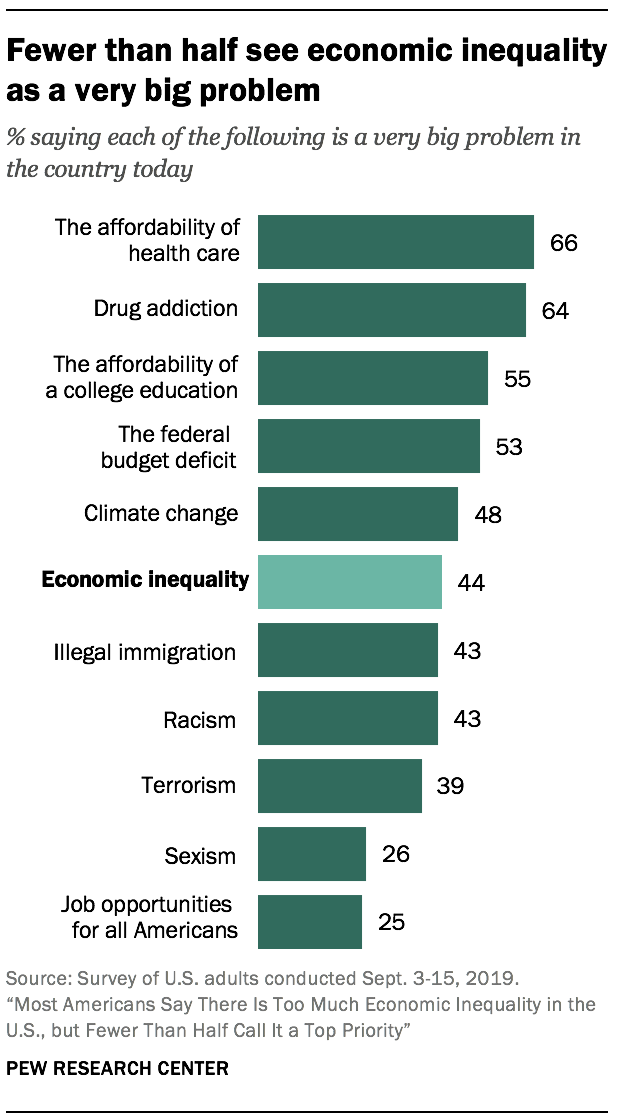
When asked about 11 major issues facing the country today, concern about economic inequality ranks around the middle of the pack, with 44% saying this is a very big problem. By comparison, about two-thirds say the affordability of health care (66%) and drug addiction (64%) are very big problems.
The affordability of college, the federal budget deficit and climate change are also viewed as big problems by higher shares of adults. Inequality is roughly on par with concerns about illegal immigration and racism. And more view it as a very big problem than say the same about terrorism, sexism and job opportunities for all Americans.
Adults with lower incomes are more likely than those with middle or upper incomes to say that economic inequality is a very big problem in the country today. About half of lower-income adults (53%) say this, compared with 41% of middle-income Americans and 42% of those with higher incomes.17
Concern over economic inequality also varies by partisanship. Two-thirds of Democrats – compared with just 19% of Republicans – say inequality is a very big problem in the country today. Again, Republicans’ views on this differ significantly by income. Lower-income Republicans (35%) are much more likely than their middle-income (15%) and higher-income (8%) counterparts to say that economic inequality is a very big problem. Among Democrats, majorities of upper-, middle- and lower-income adults say economic inequality is a very big problem. Upper-income Democrats are somewhat more likely than lower-income Democrats to express this view (71% vs. 63%).
Lower-income Americans are more likely than other income groups to say reducing economic inequality should be a top priority for the federal government
Just as economic inequality doesn’t rise to the top of the list of “very big problems,” according to the American public, it’s not viewed as the most pressing policy priority for the federal government to address. About four-in-ten U.S. adults (42%) say that reducing economic inequality should be a top priority for the federal government, placing it lower on the list than making health care more affordable (72%), dealing with terrorism (65%), reducing gun violence (58%) and climate change (49%), and roughly equivalent to reducing illegal immigration (39%).
The degree to which Americans see reducing income inequality as a priority differs by income and by party. Adults with lower incomes are more likely than those with middle and upper incomes to say this should be a top priority. And, by a margin of roughly three-to-one, Democrats are more likely than Republicans to say the same (61% vs. 20%).
Among Republicans, differences by income tier persist. While few Republicans overall say economic inequality should be a top government priority, lower-income Republicans are far more likely than higher-income Republicans to say this (35% vs 9%). Democrats, on the other hand, are united across income tiers. About six-in-ten Democrats across income groups say that reducing economic inequality should be a top priority for the federal government.
For those who say reducing inequality should be a government priority, large majorities point to unfair access it affords the wealthy and limits it places on others
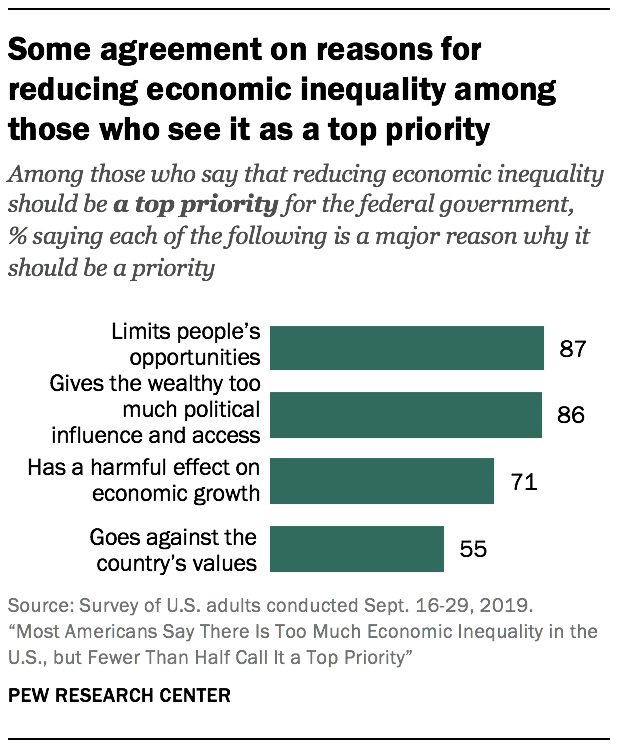
When Americans who say reducing economic inequality should be a top priority for the federal government are asked why they believe that, 87% say inequality limits people’s opportunities. A similar share (86%) says a major reason why reducing inequality should be a priority is that inequality gives the wealthy too much political influence and access. About seven-in-ten (71%) point to the harmful effect inequality has on economic growth, while 55% say inequality goes against the country’s values.
Views on why reducing inequality should be a top priority for the federal government differ somewhat by party. For example, 89% of Democrats who say reducing inequality should be a top priority say the fact that inequality limits people’s opportunities is a major reason why it should be addressed, while 79% of Republicans say the same.
Majorities of Republicans and Democrats who say reducing inequality should be a top priority also point to inequality giving the wealthy too much political influence and access and being harmful to economic growth as major reasons why they think reducing inequality should be a priority.




